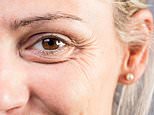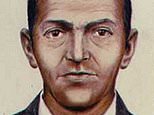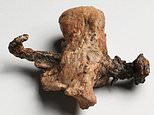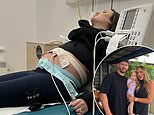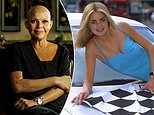EXCLUSIVEI fast, juice cleanse and exercise - so why have I been diagnosed with killer colon cancer?
A New York City nightlife maven, beloved by everyone from Celine Dion to Selena Gomez, has revealed his shock colon cancer diagnosis at the age of 54.
Desta, who goes by his first name only, spent more than three decades working in the fashion and nightlife industries but told DailyMail.com maintaining his health was his top priority.
His diet consisted of multiple juices and one solid meal a day, telling this website: 'I would generally eat one meal a day, towards the end of the day and when I woke up in the morning I would always get a fresh juice from an organic store containing greens, turmeric and ginger.'
The illustrious party planner, event manager and PR consultant, who ran the exclusive members-only Chapel Bar, said his only 'bad guilty pleasure was eating a heavy meal late at night with a glass of wine.'
But as he led an otherwise healthy lifestyle and has no cancer in his family, Desta was shocked when doctors told him he had stage 3 colon cancer in September.
Looking back at this lifestyle, though, he believes his late night bites and alcohol consumption might have been a contributing factor to his disease.
The native Ethiopian said: 'My go to late night meals were pasta or rice with the red wine. I do feel like that was what triggered it.'
And a study released earlier this year could lend support to Desta's theory. The researchers found eating within three hours of bedtime at least four days a week could increase chances for developing colorectal cancer.

Desta spent more than three decades working in the fashion and nightlife industries but he told DailyMail.com that maintaining his health was always of upmost importance
Researchers from Rush University Medical College in Chicago questioned 664 people getting a colonoscopy to screen for cancer, and 42 percent said they were late eaters.
This group was more 46 percent more likely than non-late eaters to have an adenoma – a small noncancerous lesion – found during their colonoscopy.
An adenoma is not cancer itself, but an estimated five percent to 10 percent of them become cancerous over time
While Desta would consume mostly fruits and veggies during the day, he turned to carbs and alcohol at night.
He said: 'During lunch hours, I would drink another shake but with more ingredients in it, with my favorite additions being Kefir milk, blueberries, papaya or mango, and some salt.'
Going one step further, twice a week he would 'supplement the green juice with a detox juice containing carrots, beets, celery, apples, turmeric, and ginger' and he would take a cocktail of vitamin tablets - 'usually C, D and B' - and glutathione to encourage healthy liver function.
But, he would then indulge in post-clubbing meals of pasta, rice and wine: 'These high carbohydrate meals are pure sugar and I would have them very late at night after leaving the bars and clubs.'
Dr Suneel Kamath, a gastrointestinal oncologist at the Cleveland Clinic in Ohio, told DailyMail.com in Desta's case, the alcohol could have contributed to his cancer but the 'myth' about sugar causing cancer is '100 percent a myth... so the pasta in this case was not the issue at all.'
However, Dr Kamath added: 'I agree that wine definitely increases colon cancer risk, among many other types of cancer.
'The alcohol in wine breaks down into oxidants (the most talked about in the media is acetaldehyde), which can damage the DNA in cells and cause them to mutate into cancer cells.
'While it was once thought that one glass a wine a day was beneficial for heart health, it actually turns out that any alcohol, including wine, is not helpful for heart health and also increases the risk of developing many types of cancer, including colon, breast, esophageal, gastric, throat/tongue cancer and liver cancer.
'It actually doesn't matter what type of alcoholic drink - beer vs. liquor vs. wine - all of them are equally carcinogenic as an equivalent amount of alcohol content is consumed.'
The US Department of Health and Human Services recommends that people consume alcohol 'in moderation', with women advised to consume no more than one drink a day or seven drinks a week and for men, the allowance is doubled.
Desta said the first sign of colon cancer was a change in his bowel habits this spring, a common symptom colon cancer patients experience, but one that is often misdiagnosed, delaying crucial treatment.
At first, he thought it was his daily juices, so he cut them out.

The illustrious party player, who most recently ran the now-defunct members-only club Chapel Bar said his only 'bad guilty pleasure was eating heavy meal late at night with a glass of wine'
But when his symptoms didn't subside, he visited a doctor for a check up.
Detailing the chain of events, he said: 'A couple of months before June, I started to get a feeling that something wasn't quite right and I had a really strange bowel movement.
'It wasn't quite diarrhea, but my stomach just felt all over the place. I'm very much in tune with my body and how I feel, so for a long time I knew something was not right.
'I thought that it could be my juices so I stopped taking them, but my bowel movement didn't really change much... it was kind of chaotic.
'But the bowel movements came and went and there was not pain or anything. I just made sure to be very vigilant of what was coming out of me.'
His doctor ordered blood tests and said there was nothing wrong, other than he had low vitamin D levels and his cholesterol was high.
However, these subtle signs were an indicator of a bigger problem.
Epidemiological studies suggest that deficiency of vitamin D increases the incidence of colon cancer, and there is a potential link between high cholesterol levels and an increased risk.
As his mother and aunt were very sick in Ethiopia, Desta left New York for the summer thinking his health was ok, but while away, his condition worsened and he noticed blood in his stool.
Desta booked a flight back to Manhattan and immediately went for a colonoscopy - the standard screening for colon cancer.
Doctors discovered two cancerous masses in his colon, and diagnosed him with stage III cancer.
Instead of removing the masses, doctors at Memorial Sloan Kettering Cancer Center decided to put Desta on a chemotherapy treatment plan for three months.
Being a prominent figure in the New York social scene, Desta said it was impossible to hide his cancer and his black palms from chemotherapy were a sure giveaway something was wrong - as was his lack of energy.
Since revealing his cancer battle, Desta says he has been 'shocked by the outpouring of love' from those in his community.
Most recently Josh Wyatt - the CEO of Manhattan's premier club venue Brooklyn Mirage - hosted a fundraiser to raise money for Desta's cancer treatment, with more than 500 guests attending, including world-class DJs and performers.
And despite closing down, his former boss at Chapel Bar extended his medical insurance to assist with treatment costs, while his friends have set up a GoFundMe.
Desta said: 'I don't believe in keeping secrets, especially about something like this. I believe in spirituality. I believe in people. That's my sickness. I love people.
'So when you tell people about these things, about your challenges, they think of you. They pray for you. So I believe energy really elevates and heals. So I didn't want to hide it.'
Dr Pashtoon Kasi, medical director of gastrointestinal medical oncology at City of Hope Orange County in California, told DailyMail.com that unfortunately, stories like Desta's are on the rise.
He said exposure to toxins, lifestyle habits, and diet, especially the consumption of ultra-processed foods, may create conditions that influence cancer development at an earlier age.
Additionally, researchers are beginning to investigate how antibiotic exposure in childhood is associated with development of colorectal cancer, as well as examining how the body's microbiome plays a role.
In a bid to curb rising cancer rates among younger people, Dr Kasi said 'education is vital.'
He added: 'Younger adults need to understand the symptoms and prioritize screening, which helps detect cancers at their earliest, most treatable stages.
'Community physicians must also stay informed about these trends and proactively order the necessary tests or workup if symptoms persist.
'Lifestyle changes are equally important. Regular exercise, a healthy diet, reducing alcohol consumption, not smoking, and avoiding ultra-processed foods are all tangible essential steps till we get a better understanding of what else is contributing.
'In addition, continued investment in cancer research is crucial.'
Desta's story comes amid an explosion in cancers in young people around the world and colon cancer is among the fastest rising.
Diagnoses are expected to rise by 90 percent in people 20 to 34 years old from 2010 to 2030.
The five-year survival rate for colon cancer is 64 percent, but that drops to 14 percent if the cancer has spread, which commonly occurs in early-onset cases because symptoms are often not present or are misdiagnosed until the cancer has spread throughout the body.
Symptoms include changes in bathroom habits, blood in stool, weakness, fatigue, nausea, loss of appetite, a lump in the abdomen or rectum, diarrhea, abdominal cramping, constipation and vomiting.
Now, Desta is undergoing treatment and his doctors are hopeful chemotherapy will help send him into remission.




